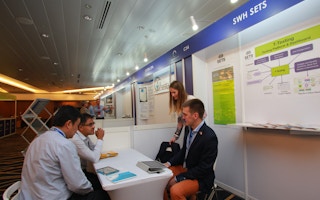European clean technology firms and their Southeast Asian counterparts spent a week exploring new collaborations and growth opportunities during a trade mission to Singapore and Vietnam - a move that is expected to strengthen trade ties between both regions.
To continue reading, subscribe to Eco‑Business.
There's something for everyone. We offer a range of subscription plans.
- Access our stories and receive our Insights Weekly newsletter with the free EB Member plan.
- Unlock unlimited access to our content and archive with EB Circle.
- Publish your content with EB Premium.
Organised by the EU delegation to Singapore, the EU Business Avenues trade mission brought 41 small and medium enterprises (SMEs) from Europe’s energy efficiency, pollution, waste and water technology sectors to explore opportunities in Southeast Asia.
In Singapore, a two-day event from 16 to 17 June held at the Suntec Singapore Convention & Exhibition Centre facilitated more than 250 meetings between SMEs from both regions on ways to tap on growth opportunities together.
Possible partnerships include distribution agreements, joint ventures to adapt European technologies for Asia, and Asian companies paying European companies royalties to use their technologies, said the organisers.
Raffaele Quarto, head of the EU Delegation to Singapore’s economic and trade section, noted that sustainable development is becoming a key priority for many countries in ASEAN.
By bringing established European technologies here, the EU Business Avenues programme allows countries here to leapfrog old technologies and directly implement newer, more efficient ways to reduce environmental impact, he said.
While Singapore is an important and mature market for these technologies, “it is also the best entry point for the region” due to its strong linkages with other Southeast Asian countries, he added.
Among the 41 companies participating in this trade mission was Malta-based AquaBioTech Group, which specialises in aquaculture technology, where fish can be hatched and grown in tanks fitted with water recirculation systems.
Shane Hunter, technical director, AquaBiotech Group, said that using aquaculture technology to hatch and breed fish is a strong proposition in Asia, where seafood is popular. The company’s reason for participating in the programme was to find a partner in Singapore or Vietnam to operate a commercial-scale farm using its technology, he added.
The partner would receive technical support from AquaBiotech, and provide data on the farm’s operations back to the company, explained Hunter.
Another visiting company, German firm Tholander Ablufttechnik, which specialises in wastewater treatment, air pollution control and biogas production among others, already has an established presence in Singapore and the region.
“
We hope to do business not only in Singapore, but also work with companies here to venture in to the region.
Thomas Pliefgensdoerfer, managing director, Tholander Ablufttechnik
But Tholander’s managing director Thomas Pliefgensdoerfer said that the programme is a good platform to make new contacts and strengthen existing ties.
“There is high demand for solid waste and wastewater treatment in regional countries such as Vietnam,” he said. “We hope to do business not only in Singapore, but also work with companies here to venture in to the region.”
The Business Avenues programme not only provides a platform for these companies to expand, but it is also a sign of friendlier ties between the EU and Southeast Asia, noted Quarto.
After negotiations for a region-to-region free trade agreement (FTA) between Europe and the Association of Southeast Asian Nations (ASEAN) were paused in 2009, the EU has embarked on bilateral negotiations with countries.
It has ongoing negotiations with Singapore, Malaysia, Vietnam and Thailand. The European Commission completed negotiations for a FTA with Singapore in October 2014, which was also the EU’s first ‘green’ FTA where both parties commit to ensuring that trade supports sustainable development.
While both parties have signed the agreement, the European Parliament has to give its consent before it is ratified.
To give meaning to the work being done at the policy level, European “companies really have to engage with business partners in the region,” said Quarto. “That’s why we launched the EU Business Avenues programme.”
The programme replicates a similar series of trade missions organised by the EU to Japan and Korea, an initiative known as EU Gateway. Every euro invested in this programme generated five euros of additional business.
The European cleantech companies were carefully selected and coached prior to their participation. The mission’s partners and supporters in Singapore included the National Environment Agency, the national water agency PUB, the Sustainable Energy Association of Singapore, and Singapore Business Federation, among others.
Ellen Pedersen, programme manager for business cooperation and trade partnership instrument, European Commission, added that 63 percent of the meetings that took place during EU Gateway led to business deals. The EU Business Avenues programme would also be tracking these outcomes, she said.
Over the next five years, EU Business Avenues aims to bring companies from other sectors into the region as well.
While nothing has been finalised yet, “we think the healthcare and medical devices sector has huge potential in the region,” said Pederson. Consumer products could also be a promising growth area in Southeast Asia, where incomes and populations are increasing.
But even as the sectors and target countries for future visits are be finalised, Singapore will remain the launchpad into the region, said Quarto.










